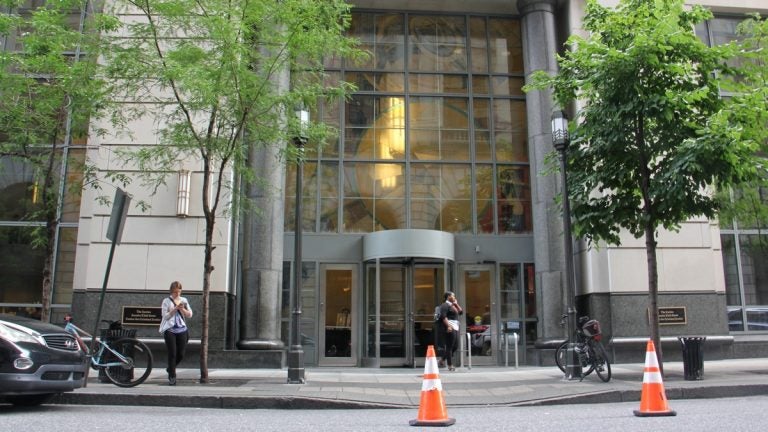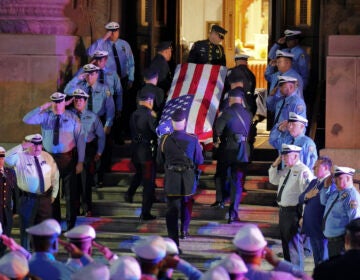Prosecutors seeking 20 more years for Philly juvenile lifer who killed cop
Andre Martin has been in prison for 41 years since a jury convicted him of murdering a Philadelphia police officer with a bullet to the head.

The Juanita Kidd Stout Center for Criminal Justice in Philadelphia. (Emma Lee/WHYY)
Andre Martin has been in prison for 41 years since a jury convicted him of murdering a Philadelphia police officer with a bullet to the head.
He pulled the trigger when he was just 15.
Martin’s punishment was to spend the rest of his life in prison. Now he is one of hundreds of Philadelphia lifers who have been given a chance of freedom after the highest courts in Pennsylvania and the U.S. outlawed automatic life sentences for teenage offenders.
It was clear on Tuesday, however, that Martin’s resentencing hearing would stand out among the 147 of about 300 juvenile-lifer cases prosecutors have so far reviewed.
The courtroom was packed with the family and other loved ones of slain Officer John Trettin. A throng of uniformed police filled seats in the back of the courtroom.
A number of Martin’s loved ones also attended.
Sobs from both sides of the courtroom sounded during three hours of wrenching testimony.
Judge Barbara McDermott expected that it could take three days for both sides to put witnesses on the stand before she decides whether to offer Martin a second chance by making him eligible for release on parole.
Prosecutors say Martin, now 57, deserves at least another two decades in prison for killing the law enforcement officer. They are asking that Martin be resentenced to 60 years to life for his 1976 crime — the harshest new term prosecutors in Philadelphia have sought for a juvenile lifer.
“John Trettin was killed for the job he chose to take to protect society,” said Laurie Moore, an assistant Philadelphia district attorney.
Martin’s lawyers argued that releasing him would provide an opportunity for Martin to counsel troubled youth, as he has already acted as a life adviser to many he has met while serving time.
In addition, they said, spending decades behind bars has allowed Martin to confront his past actions, a reckoning that has transformed him and positioned him well to re-enter society.
Unending grief and a troubled past
Defense lawyer Louis Natali told the court Martin was raised in an “extremely chaotic” family, saying Martin’s mother had four children by four different fathers. Martin, Natali said, was “severely abused” for always being in trouble as a kid.
Yet several members of Trettin’s family and other supporters, who delivered emotional testimony on the stand, made it clear that any tumult Martin endured as a child does not make him less culpable.
Trettin’s father, Walter Trettin, said he will forever remember the call he received from former Philadelphia Police Commissioner Joseph O’Neill shortly after the shooting.
“He advised me that Johnny had died,” he said.
David Trettin, brother of John, submitted a letter to the court that was read by victim witness coordinator, Amanda Bee.
“That day a piece of me died with my brother,” Trettin wrote. “Every time a news flash comes across the television screen about an officer shot, we relive that horrific night. This is a life sentence for us.”
Wendy Callon, one of Trettin’s daughters, said growing up without a father was a struggle, especially when she was battling cancer.
“I didn’t have my dad to kiss my hand and tell me everything would be OK,” Callon said.
Roseanne Gleeson, a juvenile aid officer at the time of Trettin’s death, recalled seeing his three children at their home: a 10-month-old leaning against his playpen and two little girls lying on the couch “waiting for their father to come home,” she said. “That will forever be imprinted on my mind.”
Trettin, 29, was a South Philadelphian and a five-year veteran of the police department. He served in Vietnam, played the banjo and was a Mummer.
He died on Feb. 29, 1976, four days after Martin shot him when he arrived at the scene to arrest someone else. In addition to his three young children, he was survived by his wife, who has since died.
More witnesses expected to testify
Natali told the court that Martin’s friend had been fatally shot by police and that he wanted to take a police officer’s life to avenge his friend’s death.
Prosecutors said that there were two other young men with Martin just before the shooting who pressured him not to do it, though Martin went through with it anyway.
“He couldn’t be stopped. He wouldn’t be stopped,” said Moore.
The majority of the hearing was consumed with prosecution witnesses, but the defense did call Paul Martin — Andre’s brother — to the stand.
He told the court that Andre Martin suffered the most beatings from his parents as punishment for misbehaving.
Unsure about the details of the crime himself, Paul Martin, a former SEPTA bus driver, said his brother never discussed with him how he felt about the deadly episode. That’s despite the two staying in contact over the decades Andre Martin has been serving time.
Assistant District Attorney Chesley Lightsey found that odd.
“In 41 years, you never asked him, ‘How do you feel that you killed a police officer?'” Lightsey asked.
“No,” Martin replied.
Among witnesses the defense team is expected to call are a corrections officer who oversaw Martin and will testify about his exemplary prison record; a psychologist; and a fellow inmate who will discuss how Martin lifted him out of a depressive state while in jail.
Prosecutors also plan to have several more witnesses testify.
WHYY is your source for fact-based, in-depth journalism and information. As a nonprofit organization, we rely on financial support from readers like you. Please give today.




